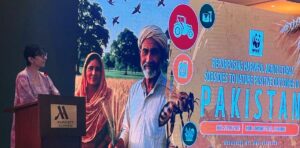Experts urge overhaul of agricultural subsidies to promote environmental sustainability
-The study indicates that agricultural subsidies encourage unsustainable practices, leading to soil and water degradation, biodiversity loss, and increased greenhouse gases
Islamabad, report #Imranakoma #Pakistansagriculturalsubsidies intended to support food security and rural livelihoods, have instead led to environmental degradation, economic inefficiencies, and widening gap between large and small farmers”. Speakers said this while presenting the results of a study titled “

Islamabad, report #Imranakomal#RepurposingHarmfulAgriculturalSubsidies to #NaturePositiveOutcomes in #Pakistan ” during the workshop in a local hotel on Monday. The speakers said that the internationalframeworks on #biodiversityconservation are increasingly calling for the reform of #environmentally #harmful #subsidies ( #EHS ), which were a major driver of biodiversity loss. They stressed that these subsidies encourage unsustainable practices such as overuse of freshwater, fertilizers, and fossil fuels, leading to #soildegradation and #waterpollution, posing serious threats to threatened wildlife. Speakers noted that these subsidies should be revisited as they #distortmarketdynamics, often favouring #carbonintensive or #ecologically #destructiveagricultural models over sustainable alternatives.
The study undertook a comprehensive empirical assessment across major cereal-producing regions to evaluate the current subsidy scenarios and explore pathways for reform alignment with climate resilience, environmental sustainability, and equity. The research was based on the primary data collected from 380 farmers and other stakeholders, including academics, researchers, extension agents, seed and fertilizer companies, policy-makers, and financial institutions across Punjab, Sindh, Khyber-Pakhtunkhwa, and #GilgitBaltistan. The study, focusing on major crops such as #wheat, #rice, and #maize, revealed that 90 per cent of #farmers were #dissatisfied with the current #subsidyregime, with nearly 70 per cent stating that benefits primarily accrued to large landowners. The study indicated that the subsidies for #fertilizers, pesticides, and irrigation encouraged unsustainable practices, leading to soil and water degradation, biodiversity loss, and increased greenhouse gases.
In his remarks, Rab Nawaz, Senior Director Programmes, #WWFPakistan , said that Pakistan currently spends over PKR 500 billion annually on agricultural subsidies that could be redirected to promote environmental sustainability, climate #resilience, and improve #inclusivity. Considering the negative impacts of #agricultural subsidies, #thegovernment should repurpose them towards climatesmartagriculture, #naturebased solutions, and performance-based interventions. “Our #agriculturalpolicies and plans should support organic and sustainable inputs, #investment in #agroecological practices, improved extension services, and #capacitybuilding programmes for different stakeholders, #including #smallscale farmers and #landowners,” Nawaz added.
Dr. Haroon, Economic Consultant at #theMinistryofNationalFoodSecurity and Research, shared that the Government of Pakistan recognizes the urgent need to align agricultural support systems with its #climate and #biodiversity commitments. This study offers timely evidence to guide policy reform that ensures our subsidies not only support food security but also promote sustainable farming practices, #environmental stewardship, and #longtermresilience for our rural communities.
Dr. Akhter, #LeadConsultant of the Study, said that our analysis reveals that while subsidies have aimed to strengthen agricultural output, their current structure often undermines environmental health and equity. The findings underscore a clear path forward, repurposing harmful subsidies toward nature-positive, climate-resilient practices that benefit both farmers and #ecosystems.
#Agriculture, a significant factor in deforestation and biodiversity loss, receives over $540 billion annually in global support, with 87 per cent of it being detrimental to nature, indicating a misalignment in fiscal focus. In Pakistan, agricultural subsidies are largely driven by food security and economic stabilization goals, often neglecting environmental impacts. The rice subsidy through procurement guarantees and water-pricing incentives has driven water-intensive paddy cultivation, thus exacerbating groundwater depletion and methane emission and discouraging crop rotation. It has been established through different studies that the agriculture sector contributes to carbon emissions due to the overuse of fertilizers associated with subsidies.
The workshop concluded with a clear call to action to reform agricultural subsidies in order to lower emissions, promote climate-smart agriculture, and enhance access to international climate finance. Speakers suggested that repurposing agricultural subsidies is not only a fiscal necessity but also provides a pathway to building a more equitable, environmentally sustainable, and resilient future for Pakistan’s agriculture sector and #ruralcommunities .
#imranakomal #imranasaghar #bunjaarun

